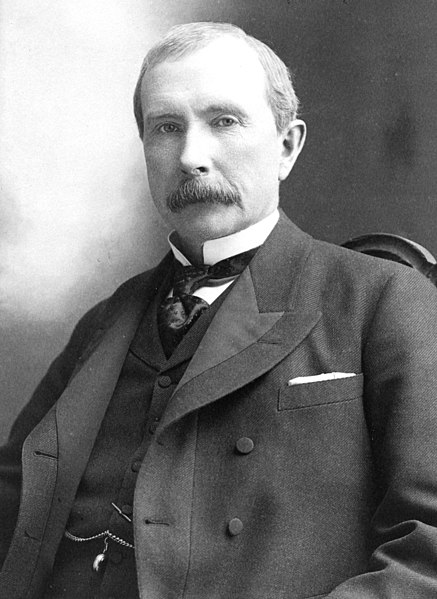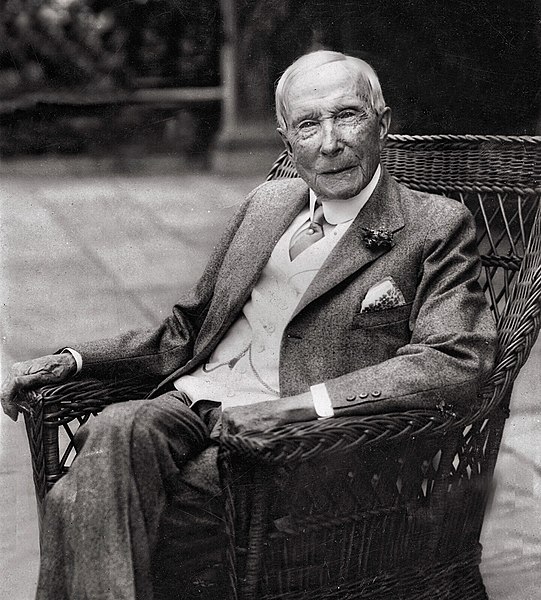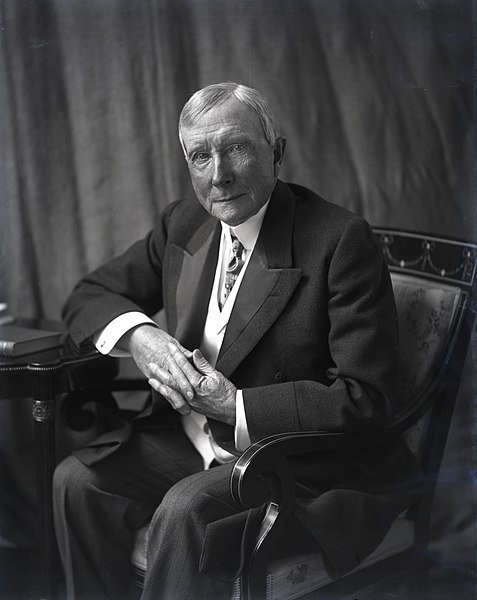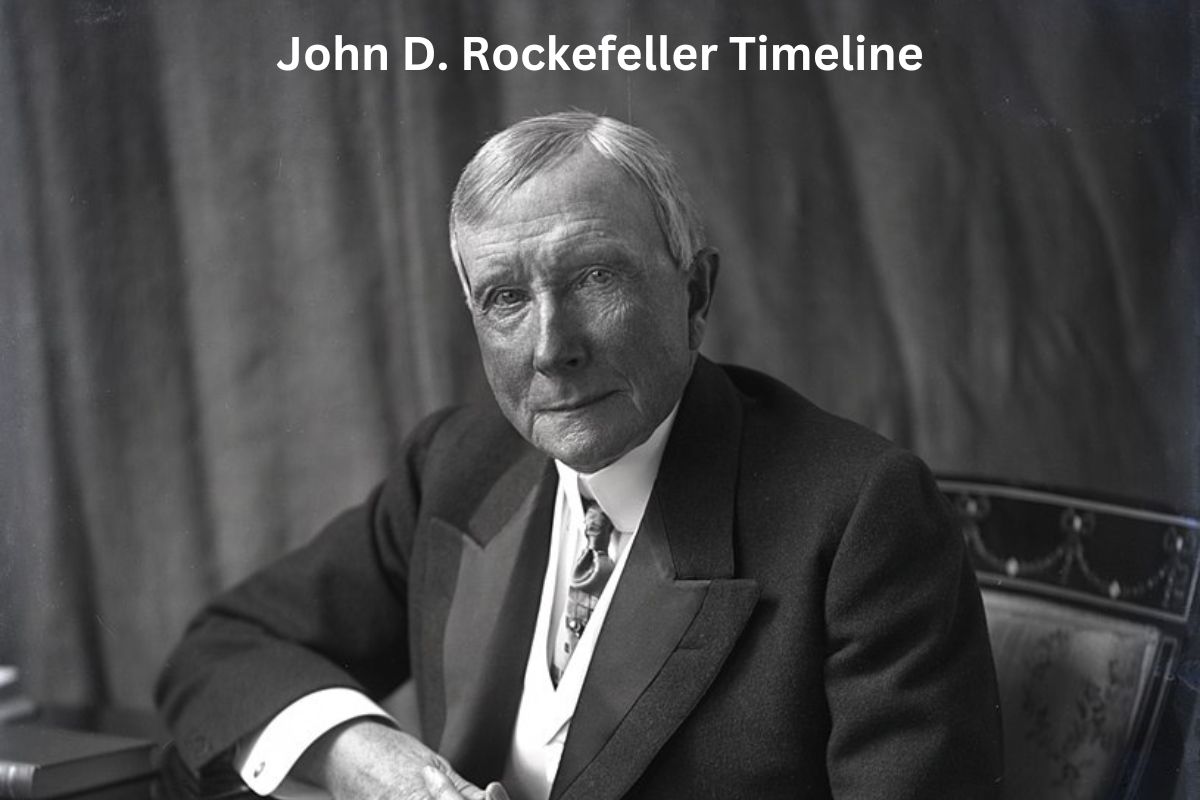John D. Rockefeller, born in 1839, was a towering figure in American business and philanthropy during the late 19th and early 20th centuries.
He is best known for his role in founding and leading the Standard Oil Company, which became a dominant force in the oil industry. Rockefeller’s business practices led to the eventual breakup of Standard Oil and significant changes in antitrust laws.
Beyond his business success, he made a lasting impact through his philanthropic endeavors, including the establishment of the Rockefeller Foundation and the Rockefeller Brothers Fund, which continue to support various charitable causes to this day.
| Year | Event |
| 1839 | John Davison Rockefeller is born in Richford, New York, USA. |
| 1853 | Rockefeller’s family moves to Cleveland, Ohio, where he attends Central High School. |
| 1855 | At the age of 16, Rockefeller gets his first job as an assistant bookkeeper with Hewitt & Tuttle, a commission merchant and produce-shipping firm. |
| 1859 | Rockefeller forms a partnership with Maurice B. Clark and Samuel Andrews to create the firm Clark & Rockefeller, which refines crude oil. This marks the beginning of his career in the oil industry. |
| 1870 | The Standard Oil Company is founded by Rockefeller and his associates, consolidating various oil refining and distribution companies under one umbrella. |
| 1882 | Standard Oil Trust is established as a way to consolidate and control various Standard Oil entities. This trust structure allows Standard Oil to dominate the oil industry. |
| 1890 | The Sherman Antitrust Act is passed, aimed at curbing monopolistic practices. Standard Oil faces increasing scrutiny and legal challenges. |
| 1892 | The Ohio Supreme Court orders the dissolution of the Standard Oil Trust under the state’s antitrust laws. |
| 1899 | Standard Oil of New Jersey is formed as a holding company to replace the Standard Oil Trust. |
| 1902 | Rockefeller retires from the day-to-day operations of Standard Oil but remains heavily involved in the company’s affairs. |
| 1911 | The U.S. Supreme Court, in the case of Standard Oil Co. of New Jersey v. United States, orders the breakup of Standard Oil, declaring it an illegal monopoly. This results in the formation of several independent companies, including Exxon (Standard Oil of New Jersey) and Chevron (Standard Oil of California). |
| 1914 | John D. Rockefeller Sr. passes away at the age of 97 in Ormond Beach, Florida. |
| 1940 | The Rockefeller Brothers Fund is founded by John D. Rockefeller’s five sons: John D. Rockefeller Jr., Nelson Rockefeller, Laurance Rockefeller, Winthrop Rockefeller, and David Rockefeller. This foundation supports various philanthropic endeavors. |
Timeline of John D. Rockefeller
1839: John Davison Rockefeller is born in Richford, New York, USA
John Davison Rockefeller, often referred to as John D. Rockefeller, was born on July 8, 1839. He was the second of six children born to William Avery Rockefeller and Eliza Davison Rockefeller. John’s early years were spent in modest circumstances in upstate New York.

1853: Rockefeller’s family moves to Cleveland, Ohio, where he attends Central High School
In 1853, when John D. Rockefeller was 14 years old, his family relocated to Cleveland, Ohio. This move would significantly influence his future career in the oil industry, as Cleveland was a burgeoning center of commerce and industry at the time.
In Cleveland, John attended Central High School, where he received his formal education.
1855: At the age of 16, Rockefeller gets his first job as an assistant bookkeeper with Hewitt & Tuttle
At the age of 16, in 1855, John D. Rockefeller started his first job as an assistant bookkeeper with the firm Hewitt & Tuttle , a commission merchant and produce-shipping firm.
Also Read: John D. Rockefeller Accomplishments
This early job provided him with valuable experience in business and finance. It marked the beginning of his journey in the world of commerce, setting the stage for his future endeavors in the oil industry.
1859: Rockefeller forms a partnership with Maurice B. Clark and Samuel Andrews to create the firm Clark & Rockefeller, which refines crude oil
In 1859, at the age of 20, John D. Rockefeller formed a partnership with Maurice B. Clark and Samuel Andrews to establish the firm Clark & Rockefeller. This company focused on the refining of crude oil, primarily from the booming oil fields of Pennsylvania.
This venture marked Rockefeller’s entry into the oil industry, which would become his life’s work and eventually make him one of the wealthiest individuals in history.
1870: The Standard Oil Company is founded by Rockefeller and his associates
In 1870, John D. Rockefeller, along with key associates and partners, founded the Standard Oil Company. This was a pivotal moment in his career as it marked the consolidation of various small and competing oil refining and distribution companies under one centralized entity.
Also Read: Cornelius Vanderbilt Facts
Standard Oil aimed to streamline operations, reduce costs, and gain a competitive advantage in the oil industry.

1882: Standard Oil Trust is established as a way to consolidate and control various Standard Oil entities
In 1882, the Standard Oil Trust was established as a means to further consolidate and control the various entities within the Standard Oil organization.
This trust structure allowed Standard Oil to exert significant influence and dominance over the oil industry in the United States. Through aggressive business practices and acquisitions, Standard Oil came to control a substantial portion of the nation’s oil production, refining, and distribution, leading to concerns about its monopoly power.
1890: The Sherman Antitrust Act is passed, aimed at curbing monopolistic practices
In 1890, the United States Congress passed the Sherman Antitrust Act, a landmark piece of legislation designed to prevent and curb monopolistic business practices that restrained trade or commerce. This law aimed to promote fair competition in the marketplace.
As a result, Standard Oil and John D. Rockefeller’s business practices came under increasing scrutiny from government regulators and competitors who argued that the company’s dominance in the oil industry was anticompetitive and harmful to consumers.
1892: The Ohio Supreme Court orders the dissolution of the Standard Oil Trust under the state’s antitrust laws
In 1892, the Ohio Supreme Court issued a significant ruling ordering the dissolution of the Standard Oil Trust under the state’s antitrust laws. This ruling was a precursor to larger legal battles that Standard Oil would face at both the state and federal levels.
1899: Standard Oil of New Jersey is formed as a holding company to replace the Standard Oil Trust
To adapt to the changing legal and regulatory landscape, Standard Oil restructured itself in 1899. Standard Oil of New Jersey was established as a holding company to replace the earlier Standard Oil Trust.
This reorganization aimed to maintain control over various oil-related businesses while appearing to comply with antitrust laws. However, it did not end the legal challenges against the company.

1902: Rockefeller retires from the day-to-day operations of Standard Oil but remains heavily involved in the company’s affairs
In 1902, John D. Rockefeller officially retired from the day-to-day operations of Standard Oil. However, he remained deeply involved in the company’s strategic decisions and continued to exert considerable influence. His retirement marked a transition in his career from a hands-on business leader to a more behind-the-scenes figure.
1911: The U.S. Supreme Court, in the case of Standard Oil Co. of New Jersey v. United States, orders the breakup of Standard Oil, declaring it an illegal monopoly
In 1911, the U.S. Supreme Court issued a historic decision in the case of Standard Oil Co. of New Jersey v. United States. The court ruled that Standard Oil had engaged in anticompetitive practices, including monopolistic behavior, and ordered its breakup. This decision marked the end of Standard Oil’s monopoly over the American oil industry.
The breakup of Standard Oil resulted in the creation of several independent companies, often referred to as the “Baby Standards.” Among these companies were Exxon (formerly Standard Oil of New Jersey) and Chevron (formerly Standard Oil of California), which would go on to become major players in the global oil and energy sector.
1914: John D. Rockefeller Sr. passes away at the age of 97 in Ormond Beach, Florida
In 1914, John D. Rockefeller Sr. passed away at the age of 97 in Ormond Beach, Florida. He had retired from active business involvement but continued his philanthropic endeavors during his later years. Rockefeller’s passing marked the end of an era in American business history.
1940: The Rockefeller Brothers Fund is founded by John D. Rockefeller’s five sons
In 1940, John D. Rockefeller’s five sons, John D. Rockefeller Jr., Nelson Rockefeller, Laurance Rockefeller, Winthrop Rockefeller, and David Rockefeller, founded the Rockefeller Brothers Fund. This philanthropic foundation was established to support a wide range of charitable and philanthropic activities.
The Rockefeller Brothers Fund has played a significant role in supporting causes related to education, public health, social justice, and environmental conservation, among others. It continues to be active in philanthropic efforts to this day.
